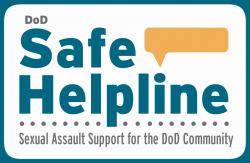The ongoing changes in the U.S. military’s response to sexual assault grew out of the recommendations made by the 2004 Task Force on Care for Victims of Sexual Assault. Based on the findings shared in that report, service members who experienced sexual assault were not always receiving care and were not reporting the crime. The DoD enacted policy in 2005 to improve access to care and advocacy services and crime reporting.
Other systematic changes included an additional reporting option for victims of sexual violence. Previously, service members who disclosed a sexual assault when receiving medical treatment or counseling services could not do so confidentially. Military healthcare providers were required to report the crime to law enforcement. Victims of sexual assault were also expected to participate in the investigation and prosecution of the alleged perpetrator. Out of fear of repercussions, a sense of unit cohesion, or a distrust of the military legal system, the 2004 task force found that victims were not making reports and not seeking immediate care (DoD, 2004). With the addition of "Restricted Reporting," service members can now seek out care and support without initiating a full investigation or notifying their command of the assault. "Unrestricted Reporting" involves making a report that also initiates an investigation. Both restricted and unrestricted reports have benefits and limitations. See the chart below for more information.
| Reporting Type: | Benefits | Limitations |
|---|---|---|
| Restricted |
|
|
| Unrestricted |
|
|
* SARC stands for Sexual Assault Response Coordinator
** The Collateral Misconduct Provision of the Department of Defense Sexual Assault Policy advises commanders to prioritize misconduct response based on the seriousness of the offenses in question. For instance, a person who was sexual assaulted while drinking underage should not avoid making a report due to fear of repercussions for their misconduct (underage drinking) (DoD, 2005).
The resources in this section pertain to elements of intervention and response that may be useful for advocates and for victims. The first section provides information on screening practices and symptoms associated with sexual trauma and PTSD. The next section offers resources on responding to and reporting sexual violence within the military system. The final two sections contain resources specifically useful for service members who experienced sexual violence and the advocates who serve them.
 DoD Safe Helpline: Victims of sexual violence in the DoD Community may click, call or text for anonymous assistance. The Online Helpline provides live one-on-one help, 24/7. DoD Safe Helpline is operated by RAINN, a civilian anti-sexual violence organization. Victims who prefer to get help by phone can call 877-995-5247 to speak with Safe Helpline staff for personalized support. Safe Helpline staff can also transfer callers to an installation or base Sexual Assault Response Coordinators (SARCs), civilian rape crisis centers or the Suicide Prevention Lifeline. Victims who prefer to find out the resources in their local area can text their zip code or installation or base name to 55-247 (inside the U.S.) or 202-470-5546 (outside the U.S.) and receive contact information for the SARC on that installation or base.
DoD Safe Helpline: Victims of sexual violence in the DoD Community may click, call or text for anonymous assistance. The Online Helpline provides live one-on-one help, 24/7. DoD Safe Helpline is operated by RAINN, a civilian anti-sexual violence organization. Victims who prefer to get help by phone can call 877-995-5247 to speak with Safe Helpline staff for personalized support. Safe Helpline staff can also transfer callers to an installation or base Sexual Assault Response Coordinators (SARCs), civilian rape crisis centers or the Suicide Prevention Lifeline. Victims who prefer to find out the resources in their local area can text their zip code or installation or base name to 55-247 (inside the U.S.) or 202-470-5546 (outside the U.S.) and receive contact information for the SARC on that installation or base.









